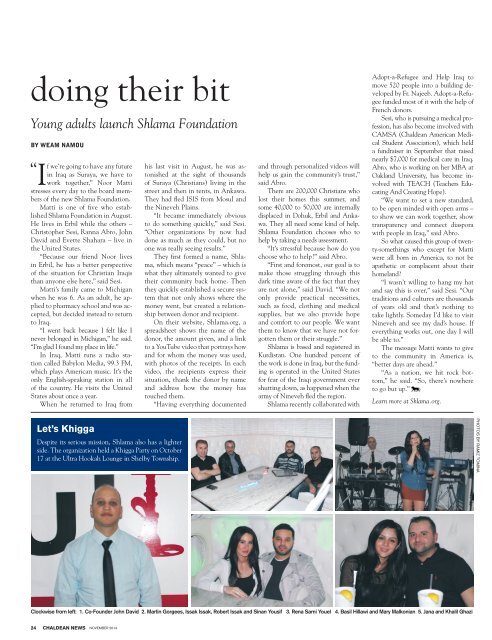Create successful ePaper yourself
Turn your PDF publications into a flip-book with our unique Google optimized e-Paper software.
doing their bit<br />
Young adults launch Shlama Foundation<br />
BY WEAM NAMOU<br />
“<br />
If we’re going to have any future<br />
in Iraq as Suraya, we have to<br />
work together,” Noor Matti<br />
stresses every day to the board members<br />
of the new Shlama Foundation.<br />
Matti is one of five who established<br />
Shlama Foundation in August.<br />
He lives in Erbil while the others –<br />
Christopher Sesi, Ranna Abro, John<br />
David and Evette Shahara – live in<br />
the United States.<br />
“Because our friend Noor lives<br />
in Erbil, he has a better perspective<br />
of the situation for Christian Iraqis<br />
than anyone else here,” said Sesi.<br />
Matti’s family came to Michigan<br />
when he was 6. As an adult, he applied<br />
to pharmacy school and was accepted,<br />
but decided instead to return<br />
to Iraq.<br />
“I went back because I felt like I<br />
never belonged in Michigan,” he said.<br />
“I’m glad I found my place in life.”<br />
In Iraq, Matti runs a radio station<br />
called Babylon Media, 99.3 FM,<br />
which plays American music. It’s the<br />
only English-speaking station in all<br />
of the country. He visits the United<br />
States about once a year.<br />
When he returned to Iraq from<br />
his last visit in August, he was astonished<br />
at the sight of thousands<br />
of Suraya (Christians) living in the<br />
street and then in tents, in Ankawa.<br />
They had fled ISIS from Mosul and<br />
the Nineveh Plains.<br />
“It became immediately obvious<br />
to do something quickly,” said Sesi.<br />
“Other organizations by now had<br />
done as much as they could, but no<br />
one was really seeing results.”<br />
They first formed a name, Shlama,<br />
which means “peace” – which is<br />
what they ultimately wanted to give<br />
their community back home. Then<br />
they quickly established a secure system<br />
that not only shows where the<br />
money went, but created a relationship<br />
between donor and recipient.<br />
On their website, Shlama.org, a<br />
spreadsheet shows the name of the<br />
donor, the amount given, and a link<br />
to a YouTube video that portrays how<br />
and for whom the money was used,<br />
with photos of the receipts. In each<br />
video, the recipients express their<br />
situation, thank the donor by name<br />
and address how the money has<br />
touched them.<br />
“Having everything documented<br />
and through personalized videos will<br />
help us gain the community’s trust,”<br />
said Abro.<br />
There are 200,000 Christians who<br />
lost their homes this summer, and<br />
some 40,000 to 50,000 are internally<br />
displaced in Dohuk, Erbil and Ankawa.<br />
They all need some kind of help.<br />
Shlama Foundation chooses who to<br />
help by taking a needs assessment.<br />
“It’s stressful because how do you<br />
choose who to help?” said Abro.<br />
“First and foremost, our goal is to<br />
make those struggling through this<br />
dark time aware of the fact that they<br />
are not alone,” said David. “We not<br />
only provide practical necessities,<br />
such as food, clothing and medical<br />
supplies, but we also provide hope<br />
and comfort to our people. We want<br />
them to know that we have not forgotten<br />
them or their struggle.”<br />
Shlama is based and registered in<br />
Kurdistan. One hundred percent of<br />
the work is done in Iraq, but the funding<br />
is operated in the United States<br />
for fear of the Iraqi government ever<br />
shutting down, as happened when the<br />
army of Nineveh fled the region.<br />
Shlama recently collaborated with<br />
Adopt-a-Refugee and Help Iraq to<br />
move 520 people into a building developed<br />
by Fr. Najeeb. Adopt-a-Refugee<br />
funded most of it with the help of<br />
French donors.<br />
Sesi, who is pursuing a medical profession,<br />
has also become involved with<br />
CAMSA (Chaldean American Medical<br />
Student Association), which held<br />
a fundraiser in September that raised<br />
nearly $7,000 for medical care in Iraq.<br />
Abro, who is working on her MBA at<br />
Oakland University, has become involved<br />
with TEACH (Teachers Educating<br />
And Creating Hope).<br />
“We want to set a new standard,<br />
to be open minded with open arms –<br />
to show we can work together, show<br />
transparency and connect diaspora<br />
with people in Iraq,” said Abro.<br />
So what caused this group of twenty-somethings<br />
who except for Matti<br />
were all born in America, to not be<br />
apathetic or complacent about their<br />
homeland?<br />
“I wasn’t willing to hang my hat<br />
and say this is over,” said Sesi. “Our<br />
traditions and cultures are thousands<br />
of years old and that’s nothing to<br />
take lightly. Someday I’d like to visit<br />
Nineveh and see my dad’s house. If<br />
everything works out, one day I will<br />
be able to.”<br />
The message Matti wants to give<br />
to the community in America is,<br />
“better days are ahead.”<br />
“As a nation, we hit rock bottom,”<br />
he said. “So, there’s nowhere<br />
to go but up.”<br />
Learn more at Shlama.org.<br />
Let’s Khigga<br />
Despite its serious mission, Shlama also has a lighter<br />
side. The organization held a Khigga Party on October<br />
17 at the Ultra Hookah Lounge in Shelby Township.<br />
PHOTOS BY RAMIZ TOMINA<br />
Clockwise from left: 1. Co-Founder John David 2. Martin Gorgees, Issak Issak, Robert Issak and Sinan Yousif 3. Rena Sami Youel 4. Basil Hillawi and Mary Malkonian 5. Jana and Khalil Ghazi<br />
24 CHALDEAN NEWS <strong>NOVEMBER</strong> <strong>2014</strong>

















